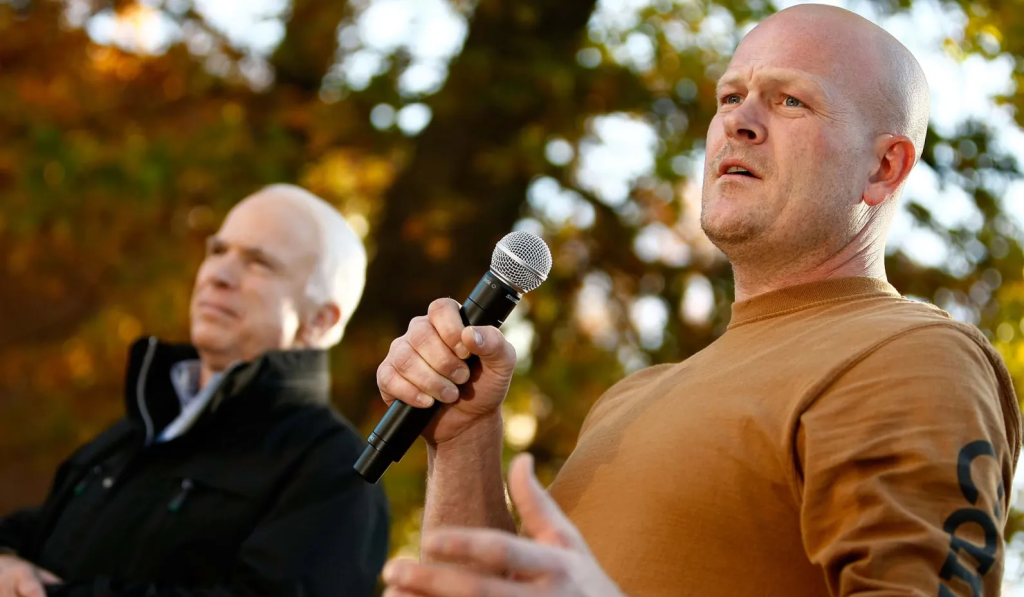
By JACK BUTLER
The nature of modern presidential politics is such that candidates for the office, as well as its occupants, are simultaneously raised to Olympian heights, and expected to have a hyper-empathetic connection to the average voter. These may seem like contradictory roles, but they are in fact related: Turning the president into a god-like figure implies worshippers, who seek a direct relationship to their deity. This is evident in the actual day-to-day of presidential administration, such as when disasters strike. It also shows up in the campaigning, often becoming the expectation of voters.
Take Denton Walthall, “ponytail guy” from the 1992 “town hall” debate between incumbent president George H. W. Bush and challenger Bill Clinton. Ringing in the therapeutic ’90s, Walthall, a social worker, asked the candidates to “make a commitment to the citizens of the United States to meet our needs, and we have many, and not yours. Again, I have to repeat that, it’s a real need, I think, that we all have.”
Which is one of the things that made Samuel Joseph Wurzelbacher, who died Sunday of pancreatic cancer at 49, unique. Seeking out then-candidate Barack Obama in October of that year’s presidential campaign at an event near Toledo, Ohio, Wurzelbacher chastised the future president for wanting the state more involved in his life, not less. “I’m getting ready to buy a company that makes $250,000 to $280,000 a year,” he said. “Your new tax plan is going to tax me more, isn’t it?” Obama admitted that a company of that size would see tax increases, but added that it would still get tax credits, and other businesses and individuals below that threshold would see tax cuts. Obama continued:
My attitude is that if the economy’s good for folks from the bottom up, it’s gonna be good for everybody. If you’ve got a plumbing business, you’re gonna be better off if you’re gonna be better off if you’ve got a whole bunch of customers who can afford to hire you, and right now everybody’s so pinched that business is bad for everybody and I think when you spread the wealth around, it’s good for everybody.
That last line — “I think when you spread the wealth around, it’s good for everybody” — took off. Wurzelbacher, quickly dubbed “Joe the Plumber,” subsequently described Obama’s answer as “kind of a socialist viewpoint” and “not the American dream.” In fall 2008, I was a 15-year-old living in Ohio and closely following a presidential campaign for the first time. Joe’s take on Obama’s answer held sway in my political conversations with friends and in contemporary conservative media, playing a significant role in my ongoing political maturation. It even, shall we say, trickled up to the next presidential debate, at which Joe was mentioned more than two dozen times, by some counts. He also joined the McCain-Palin campaign — now there’s an artifact — on the stump.
Naturally, Joe’s being thrust into the spotlight as an obstacle to Obama’s assuming the presidency, a prospect in which so many had invested so much, attracted negative media attention. It was discovered that he owed some taxes (they were soon repaid). The head of Ohio’s Department of Job and Family Services devoted state resources to investigating Wurzelbacher (after this was made public, she resigned). The nitpickers even cast doubt on his credentials as a plumber (he was inadequately licensed). Some level of scrutiny is an inevitable consequence of becoming a public figure, but the degree was unwarranted, and particularly galling given the way the press treated Obama around the same period.
Besides, Joe was more complicated than he seemed. Though he agreed to campaign with McCain, the latter’s decision to support the 2008 TARP bailout made Joe so angry he “wanted to get off the bus.” He said after the campaign that he didn’t even want McCain as the Republican nominee, and voted for him as a lesser of two evils. In 2009, as the Tea Party emerged, he issued a bipartisan lament that “the politicians in Washington are spending trillions of dollars of our money” and wondered, “When are Americans going to stand up and say enough is enough?” Joe was a prototype of the more general anti-establishment sentiment that would soon dominate our politics.
Joe remained in the spotlight, in some fashion, over the next few years. In 2012, he ran as the Republican candidate in a House race against Ohio representative Marcy Kaptur (D.), losing badly. He was a mainstay of Tea Party-era events, conferences etc. He continued to espouse his views on other topics, such as immigration and gun control, in ways one could describe as inartful — that is, if one were missing the point. For behind his comments there was never malice, nor duplicity. There was always the genuineness of an ordinary person thrust into public view, who cared more about what he believed in than how it sounded. This great country is full of such people. It could not exist without them.
Joe’s belief in the American dream is what motivated him to question Barack Obama in the first place. It is an idea he came to represent, making quibbles about his station in life or person irrelevant. A primary conservative apprehension, then as now, is that a nation as great as ours is falling short of its potential to empower its people to thrive, even choking off that potential intentionally through state action. As an avatar of aspiration, Joe worried about America because he believed in it. “The only thing I have to say is that he was a true patriot,” his son Joey Wurzelbacher told Politico. “His big thing is that everyone come to God. That’s what he taught me, and that’s a message I hope is heard by a lot of people.” Better to come to God than to the see the government, much less a president, as a godlike entity, something neither can ever be. Let Wurzelbacher’s political legacy be to remind us of that.
For your home’s drainage and water systems to function properly, you need Imperial Restoration affordable emergency plumbing Toronto. Plumbing systems may develop problems over time such as leaks, clogs or degrading pipes. These issues can affect water quality and utility. Plumbing services are available to solve a variety of plumbing issues. Are you interested in more information about this service? can see more detail https://www.imperial-restoration.ca/ These services may include drain cleaning and maintenance, pipe repair, installation of fixtures, water heater repairs, or fixture installations. You can make sure that the plumbing in your home or business is working properly by hiring a professional plumbing service. This will ensure clean water and efficient drainage as well as dependable supply. Well-maintained plumbing systems contribute to your overall home comfort and business functionality.





